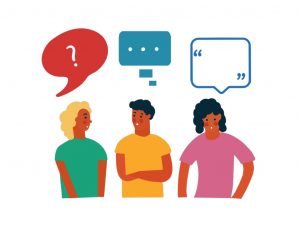How To Politely Correct Someone Who is Wrong: You, your other coworker, and the customer whose website you are creating are on a web call. Your coworker makes the claim that “the profit made from selling biscuits is 10% larger than the profit made from selling sweets” at one point. You are momentarily perplexed because you are aware that is not the case. Right before the meeting, you double-checked, but your colleague had jumbled up everything.
How do you behave? Do you correct your colleague during the meeting, maybe making them feel embarrassed, or do you wait until after? We’ve all been in similar circumstances. Knowing when and how to correct someone who is mistaken is difficult. But it’s also not impossible. Here are some techniques that make respectfully correcting someone much simpler.
Recommended: How to become a man of value
10 Tips on How to Politely Correct Someone Without Offending Them
1. Not Everything is Worth Correcting: Before correcting someone, consider if it is really necessary to fix the error in the first place. Some errors just can’t be fixed since they are so little. Because page A still has a higher bounce rate than page B in the example above, whether it’s 5 percent or 25 percent, it probably isn’t worth correcting your colleague at the meeting.

Avoid becoming a stickler for the law and let go of the need for constant perfection. Instead, rectify the faults that are serious and harmful, those that, if left unattended to, can destroy a project or, if fixed, those that can advance a person’s career.
2. Begin With Something Positive: Hey, we all have sentiments, and being told we’re mistaken is never easy. Additionally, you definitely don’t want to be the employee whose overly direct manner caused a coworker to break down in tears in the conference room.
Therefore, it’s vital to soften the impact a little before saying something like, “Hey, this is very terrible!”
Recommended: Best And Strongest Police Force in the world 2022
3. Correct With Evidence, Not Your Opinion: People have diverse methods of accomplishing things, and there are always several ways to achieve a goal. You might not agree with some of those methods. You can believe that one framework is superior to another, that a certain sort of software should be used to containerize the development environment, that this code should be written in a certain way, etc.

But if you can’t back up why people should do something your way with concrete data, you’re just giving your opinion. The other person shouldn’t be expected to change their ways, and you shouldn’t try to convince them that your method is superior just because that’s how you do things.
The other person will accept your correction far more readily if you can objectively demonstrate why something is better done this way as opposed to that way, especially if you do so in an empathic manner.
4. It’s the Way You Say It: When you correct someone, it’s frequently more about how you say it than about what you’re saying, similar to when you give criticism. For instance, you can employ the sandwich strategy, in which you begin with a nice message, correct the other person (the sandwich’s “meat”), and then end with another positive message.

Having saying that, various civilizations have varying tastes. Some cultures believe it is impolite to give someone a direct correction, while others encourage you to go right to the point. However, when working with a worldwide team, it’s advisable to err on the side of caution and minimize the impact.
Because you are not a supernatural creature, you don’t want to come out as being in charge.Your expertise isn’t necessarily better than others’ because you’ve made errors. Take a supportive stance: You are correcting someone to assist them.
Recommended: Countries with the best education system in the world
5. Correct With a Question: Sometimes it’s better to probe for information to learn how someone arrived at their particular opinion rather than just telling them they’re incorrect. It’s the Socratic technique, if you will, in which you ask probing questions to grasp their thought process.

By doing this, you might be able to pinpoint exactly where they went wrong or, even better, it can reveal that you might have been the one who made the error. Correcting someone who is telling the truth when you are incorrect is probably more uncomfortable than being corrected yourself.
6. Be Open to Stand Corrected: Finally, remember that what you do to other people may also happen to you. Be receptive to others pointing out your errors. No matter how they do it, even if it’s with malice, having someone point out your error is beneficial. You may utilize the insightful criticism to avoid repeating that error.
When someone corrects you, try to ignore any defensive or hostile feelings you may be experiencing. Stay away from venting to the other person. It is usually preferable to endure suffering in silence for a while until you have calmed down and are able to think clearly. Most likely, the offending party had no malice in mind. It is considerably more probable that they acted in your best interests.
Also see: How to stop a bad habit and replace with a good one
7. Use a Gentle, Helpful Tone: It goes without saying that your tone and entire presentation may make the difference between being helpful and being condescending.

But you should also try to refrain from employing terse, sharp phrases and non-defensive body language (like crossing your arms). Try your hardest to have a positive attitude throughout. Since your body language typically conveys far more information than your actual words, be mindful of it.
8. The Sympathetic: The world is not over if you make a mistake. However, doing so may still be rather uncomfortable for the offender, especially when called out. This is why giving that individual an explanation for the mistake might be beneficial.
A standard technique to accomplish this is to state briefly that it occurs frequently. Simply making that remark makes them feel less like a dummy for making a mistake and also makes your correction a bit more humorous. Even so, you’ll want to make sure that your correction is clear-cut and concise since you want to make your point. However, add a few hilarious remarks after that. comfortable talk.
Recommended: How to become a better version of yourself everyday
9. Offer To Help Patch Things Up: Poking holes in other people’s work or conclusions on a regular basis and then letting them handle the new knowledge is a definite way to become the most hated member of your team.

You desire to work well with others. Offer to assist them fix things if the adjustment you’re giving will need a lot more effort from that individual (would they need to rewrite the entire report or reformat some of their slides?). One study examined how our level of conviction certainty affects our capacity for cooperation or competition. It turns out that people were more prone to adopt a competitive stance in such interactions the more confident they were in their own opinions.
Simply said, if you know you’re right, your natural tendency could be to approach the topic with a “I’m right and you’re wrong” attitude. a “Na-na na-na boo-boo!” mentality.
Collaboration over competition will be emphasized if you can figure out how to not only point out wrong information but also actively help to fix it. You’ll also become much more pleasant to work with as a result.
Recommended: Differences Between Joint Tenancy And Tenancy in Common
10. Don’t Embarrass the Other Person: A common social occurrence is embarrassment. When we think our social standing has been damaged or that others are developing unfavorable impressions of us, we feel ashamed.

It is nearly always preferable to correct someone in private for this reason. Try your hardest to avoid doing it in front of other people since you don’t want them to feel attacked and react defensively.
To correct someone before they make a mistake is the best situation. Correct your colleague before the meeting begins if you know they think otherwise, but the meeting hasn’t yet begun. Most likely, they’ll appreciate what you did.
Recommended: Differences Between Unicameral And Bicameral Legislature
Conclusion
There’s no denying that it may be difficult to strike the right balance between being helpful and being condescending when correcting someone. If you use these tactics, you can be certain that your message will be received in a kind and helpful manner without having to worry about a colleague sobbing in the conference room.

Edeh Samuel Chukwuemeka, ACMC, is a lawyer and a certified mediator/conciliator in Nigeria. He is also a developer with knowledge in various programming languages. Samuel is determined to leverage his skills in technology, SEO, and legal practice to revolutionize the legal profession worldwide by creating web and mobile applications that simplify legal research. Sam is also passionate about educating and providing valuable information to people.